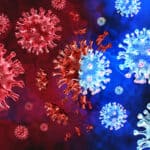Overview of post-infectious syndromes
Post-Infectious Syndromes (and Post-Viral Syndromes) refer to a group of conditions in which individuals experience long-term health issues after recovering from an acute infection, viral, bacterial or other. These syndromes often involve lingering symptoms such as fatigue, pain, and cognitive difficulties, which can persist for weeks, months, or even years.
These conditions are believed to result from immune system dysregulation, chronic inflammation, or residual effects of the infection on the body.
Examples of Post-Infectious Syndromes
- Long COVID Syndrome: Persistent symptoms following COVID-19, such as fatigue, brain fog, and shortness of breath.
- Chronic Lyme Disease and PTLDS: Ongoing symptoms like joint pain and fatigue after treatment for Lyme disease.
- Post-Mononucleosis Syndrome: Chronic fatigue and other symptoms following an Epstein-Barr virus (EBV) infection.
- Myalgic Encephalomyelitis/Chronic Fatigue Syndrome (ME/CFS): A complex condition often triggered by viral infections.
- Rheumatic Fever: An inflammatory disease that can develop after an untreated Group A Streptococcus infection (like strep throat). It can lead to long-term heart damage.
- Chronic Fatigue Syndrome/Myalgic Encephalomyelitis (ME/CFS): Although not always triggered by infections, many cases of ME/CFS develop after viral infections, such as Epstein-Barr virus (EBV), influenza, or COVID-19.
Common Symptoms
While symptoms may vary depending on the underlying infection, common symptoms of post-infectious syndromes include:
- Chronic fatigue that is not relieved by rest.
- Brain fog and difficulty concentrating.
- Muscle and joint pain.
- Sleep disturbances.
- Shortness of breath or cardiovascular issues.
- Digestive problems (e.g., irritable bowel syndrome).
GWCIM approach to Management and Treatment
Post-infectious syndromes (e.g., Long COVID, chronic Lyme disease, post-viral fatigue syndrome) are complex, multifaceted conditions that require a comprehensive, patient-centered approach to treatment and management. This is why Integrative Medicine is uniquely positioned as the most effective solution:
- Cutting-Edge Research and Innovation: Ongoing research continues to enhance our understanding of these conditions and pave the way for more effective treatments.
- Proper diagnosis: Functional medicine labs and tests, along with genetic tests, help identify the presence and impact of remaining pathogens in the body, while analyzing underlying metabolic imbalances and genetic predispositions that may hinder healing.
- Multidisciplinary Team of Experts: The GWCIM team-based approach ensures that every aspect of the patient’s health is thoroughly addressed and optimally managed by our highly skilled Integrative Medicine specialists and trusted partners.
- Holistic and Patient-Centered Care: Post-infectious syndromes impact multiple body systems, necessitating a comprehensive approach to healing, addressing physical health, emotional well-being, and lifestyle factors while recognizing the connection between body, mind, and environment.
- Focus on Underlying Cause Resolution: chronic inflammation, immune system deregulation, gut microbiome imbalances, mitochondrial dysfunction, and dysautonomia.
- Combining Conventional and Complimentary Therapies, and Lifestyle modifications: Integrative medicine combines the best of evidence-based conventional medicine with complementary and alternative therapies (functional medicine, IV-therapy and supplements, acupuncture, naturopathy, nutrition, physical therapy, mindfulness, therapeutic movement, stress management, Integrative mental health, and trauma-informed support)
- Support for Mental and Emotional Health, and Education: Living with a chronic condition like a post-infectious syndrome can take a toll on mental health, leading to anxiety, depression, or feelings of isolation. Personal counseling and Medical and Mental Health support groups are essential in providing necessary education, community support, and access to resources. GWCIM has an ongoing LongCovid medical group, offers MBSR course and mindfulness classes, and our partners are offering support groups.
- Long-Term Management and Prevention: Post-infectious syndromes often require ongoing management to prevent relapses or worsening of symptoms. Integrative medicine clinics focus on long-term care plans, providing ongoing access to support and resources.
LONG COVID program at GWCIM
The GWCIM Long COVID Program offers a comprehensive, integrative approach to managing the complex and varied symptoms of Long COVID. Led by a team of experts, the program combines evidence-based medical solutions with holistic therapies, including medication management, acupuncture, IV therapy, dietary counseling, and physical and cognitive therapies. The program also provides virtual medical groups facilitated by LongCovid Program director Ashley Drapeau, PA-C, L.Ac., and Dr. Mikhail Kogan, MD, creating an affordable and supportive space where patients can access the latest medical information and peer support. Recognized with the Innovative Hospital Award in 2024, the program has successfully served over 3,000 patients and continues to expand its reach, aiming to make comprehensive care accessible to more individuals, including underserved populations.
Our providers:
- Ashley Drapeau PA-C, L.Ac, a Long COVID program Director, GWCIM Medical Director
- Sharon Democker, MD – Integrative Medicine
- Deirdre Orceire, ND, Marianna Ledenac, ND, Paymon Sadrolsadot, ND – Naturopathic Medicine
- Mikhail Kogan, MD – Functional Medicine, Integrative Medicine
- Misty Embrey, MD and Sally Novak, LCSW – Integrative Mental Health.
- Angela Gabriel, L.Ac. – Chinese Medicine and Acupuncture, Somatic Experiencing
- Tiffany Hoyt, DAOM – Chinese Medicine and Acupuncture
- Yael Flusberg – biofeedback, yoga, and mindfulness instructor
- Nina Paul and Cynthia Powell – Mindfulness, Coaches
- and other GWCIM doctors and practitioners, and our trusted Affiliates and Partners




